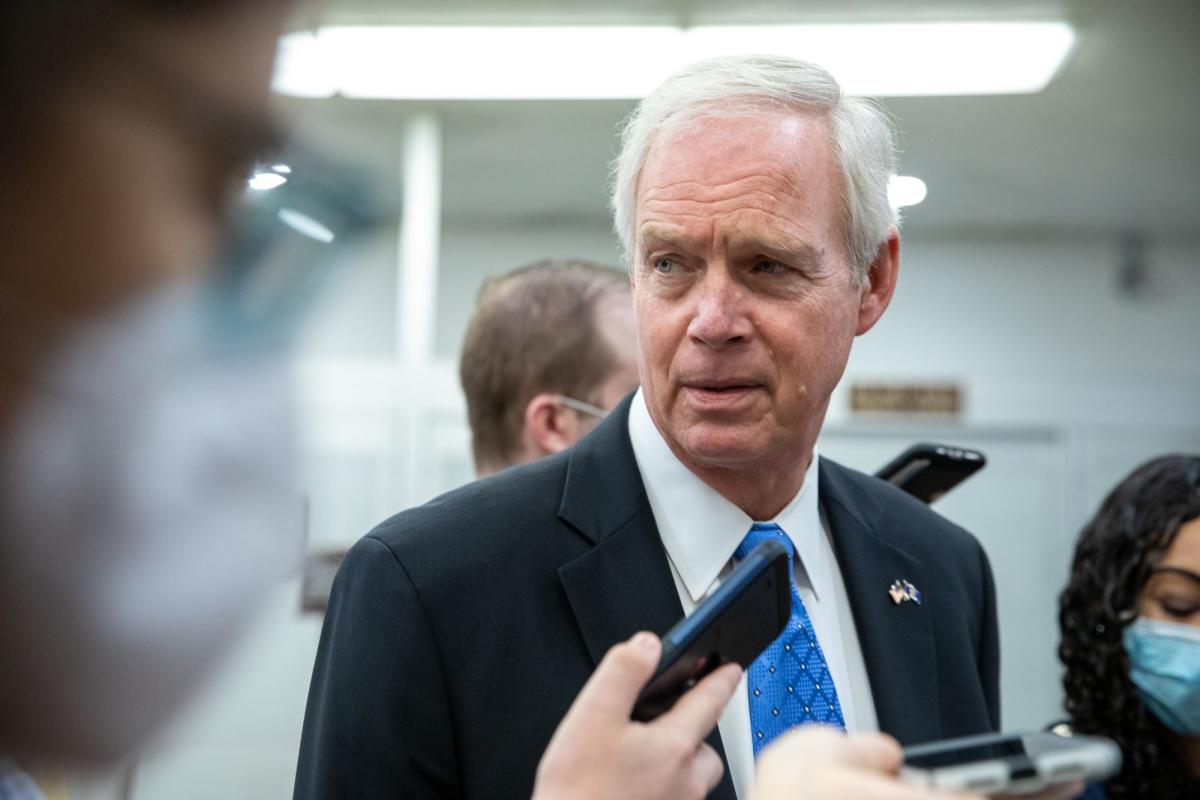
(Bloomberg) — A looming Senate vote on legislation supporting same-sex marriage has created a political bind for Wisconsin’s Ron Johnson, the most at-risk GOP senator in the November election.
Most Read from Bloomberg
The marriage equality legislation loads another contentious social policy issue into Johnson’s close contest with Democratic Lieutenant Governor Mandela Barnes. It’s one that will force him to decide whether to make a play for centrist voters or rely on his core Republican base to take him to victory in one of the five key races that will decide control of the Senate.
Johnson, who is trailing Barnes in polls, has shifted his stance since the House in July approved the Respect for Marriage Act. He said at the time he saw “no reason to oppose it,” joining just a few other GOP senators as early potential supporters.
More recently he’s called the legislation “unnecessary” and an attempt by Democrats to “create a divisive issue.”
Johnson’s hand may be forced as soon as this week when Wisconsin’s other senator, Democrat Tammy Baldwin, and Maine Republican Senator Susan Collins unveil an amendment meant to address concerns about religious freedom raised by Johnson and other Republicans. At least 10 GOP votes will be needed to pass the same-sex marriage bill.
“I haven’t seen the amendment. But I certainly wouldn’t vote for it in its current state,” Johnson said last week.
His office didn’t respond to a request for comment on Tuesday.
Collins and fellow Republican Rob Portman of Ohio are co-sponsoring the legislation with Baldwin. Senator Thom Tillis of North Carolina is participating in the talks on the amendment and has expressed optimism it will pass. Although other GOP senators say they are considering it, the votes still aren’t there and Johnson’s wavering may have hurt momentum.
Johnson, a staunch supporter of former President Donald Trump, has been campaigning for re-election by pinning the blame for high inflation on Democratic policies and spending. But social issues such as abortion and same-sex marriage have energized Democratic voters in states with key Senate races. Recent polls show Johnson running slightly behind Barnes in a race that could determine which party wins control of the 50-50 Senate.
The vote gives Democrats a chance to force Johnson on record just five months after a Marquette Law School poll found 72% of registered Badger State voters support same-sex marriage and just 19% oppose. That poll also found that a comfortable majority of Republicans there — 58% — support same-sex marriages.
Brandon Scholz, a retired Wisconsin Republican strategist, said there’s little for Johnson to gain at this point by appealing to the center to win votes.
“Wisconsin is a partisan state,” Scholz said. “We’re very red and very blue. There’s not much left in the middle, if there ever was. When we get to November, it will get down to the fundamentals of voter ID and turnout.”
Voter Base
Johnson has shown other signs he’s going all-in with his conservative base, said Charles Franklin, director of the Marquette poll. That includes taking the politically unpopular position of treating Social Security as discretionary spending to be voted on every year — an issue with little appeal outside of hard-core GOP voters.
Maddy McDaniel, a spokesperson for the Barnes campaign, said the Democratic candidate will “make sure voters across the state know just how out of touch he is with their lives and values.”
Joe Zepecki, a Milwaukee-based Democratic strategist, said Johnson has to decide whether to take a middle-of-the-road stance or stick with his conservatives base, and it appears he’s taking the latter course.
“Traditionally somebody who has high unfavorable numbers and is down in the polls would try to make themselves look more reasonable to voters, particularly in the middle of the electorate,” Zepecki said.
A “no” vote by Johnson would provide a stark contrast with Baldwin, who is openly gay and has a high-profile role in rounding up GOP support.
Most Wisconsin voters appear to already have set opinions about Johnson. An August Marquette poll found that only 38% of registered Wisconsin voters have a favorable view of the two-term senator, 47% had an unfavorable view and just 15% said they don’t know or haven’t decided. In his 2016 election, Johnson’s favorable numbers improved over time as many initially undecided voters viewed him better over time, but his low favorable numbers been static throughout the 2022 campaign, Franklin said.
“This time he has far fewer people to introduce himself to, and the trend in the last two years has been a steady increase in unfavorable views of him,” Franklin said. “That’s the big challenge for him.”
The same-sex marriage vote comes as social issues are helping Democrats in Wisconsin gain some ground, after the Supreme Court in June overturned the landmark Roe v. Wade decision establishing a constitutional right to an abortion. The decision snapped back an 1849 Wisconsin law banning abortion except to save the life of the mother.
Johnson has wrestled with the abortion issue, at one point suggesting Wisconsin women could simply cross state lines to get abortions, before issuing a late-July statement saying he supports “exceptions to abortion restrictions in the case of rape, incest, or the life of the mother.”
An August 12-16 Fox New poll of registered Wisconsin voters found Barnes leading Johnson, 50%-46%, within the poll’s margin of error. Barnes had a seven-point lead over Johnson in a Marquette Law School poll conducted August 10-15.
The Fox News poll found that Barnes enjoys greater party loyalty than Johnson does, with 96% of Democrats supporting him and 91% of Republicans favoring Johnson. Independents favor Barnes by a two-to-one margin.
(Updates with more detail on the Marquette poll in the 10th paragraph. An earlier version corrects month of Supreme Court abortion ruling in fourth paragraph from the bottom.)
Most Read from Bloomberg Businessweek
©2022 Bloomberg L.P.




